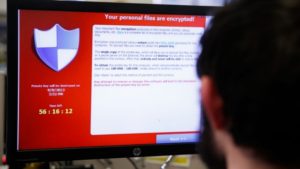A Masterton business has the dubious distinction of being one of the first companies in Asia-Pacific to be targeted by a new type of cyber attack.
Technology Solutions security expert Stephen Polley says cyber attacks on local businesses and individuals have been ramping up recently with crypto-ransomware incidents being reported in Wairarapa at a rate of about one a week.
In a recent case a consultant with cyber security software provider ESET told Technology Solutions staff after finding malware detected on a Masterton business’ computer that it was the first time they had seen this particular variant of the malicious software code in the Asia Pacific region.
“To me it just highlights the fact that we are not to think that we’re just small and out of the way. We’re being specifically targeted as a town and a community,” Polley says.
A crypto-ransomware attack is when an attacker manages to infiltrate a computer system and encrypts all the valuable files. The owner then receives a note asking them to pay a ransom to get their files decrypted.
A few years ago these ransom-style threats were just a small portion of cyber attacks but now they represent around 60 percent of all malware incidents around the world.
“It’s becoming more and more important to be aware of what’s out there because it is becoming much more advanced, and Wairarapa businesses are being targeted,” Polley says.
One of the most effective techniques at penetrating people’s defences is a method called spear phishing. This is where a cyber thief uses information that is publicly available to form a story of believability to convince people to handover money or critical security details.
“The keys to your digital kingdom are worth more than the keys to your car or even the keys to your house. Some people in our community have lost their life savings and it has split up families,” he says.
Maree McManaway had all her important files on her PC were encrypted and the anonymous ransomer demanded $1500US to unlock them. Although she was loathe to give in to the demands McManaway felt that the documents were so important to her business that she decided to pay the money, but when she discovered the hoops she would have to jump through to do so and the additional personal information she would have to give over, she changed her mind and decided to cut her losses.
The attack was a real set back for her business but it taught her some valuable lessons.
“I’m 75 per cent back now with help of tech son Regan to replacing my tools on PC. I now have new upgraded software and email- so have had a lot of cost in rebranding,” she says.
McManaway warns people to be aware of emails saying the power bill is overdue.
“I turned my door key to their robbery by opening this email.”
She put the word out over Facebook that she had been hacked and found out she was not alone.
“It was interesting to read how many other locals had also been caught out,” she says.
The main defence against an encryption attack is back-up files frequently so that you can restore them easily.
“Please back-up your precious information onto hard drive or similar as that is all that would have prevented my loss. Let my experience be your knowledge. It was at the time heartbreaking as I’m passionate about what I do, yet this is merely a bump along my pathway of life,” she says.
—
Unitec’s chief executive, Rick Ede, says “New Zealand alone is seeing more than 100 ransomware attacks every day – a 160% increase since 2014,”.


 PIERS FULLER 16:45, April 19 2016 – Stuff
PIERS FULLER 16:45, April 19 2016 – Stuff